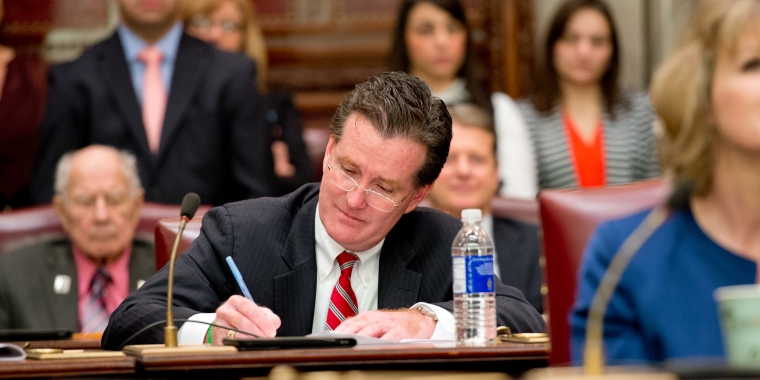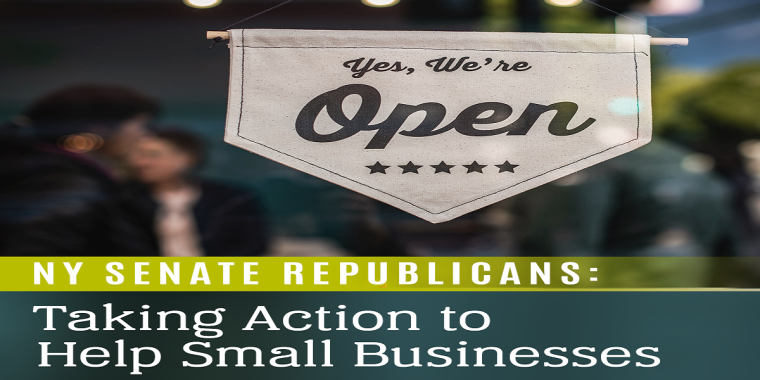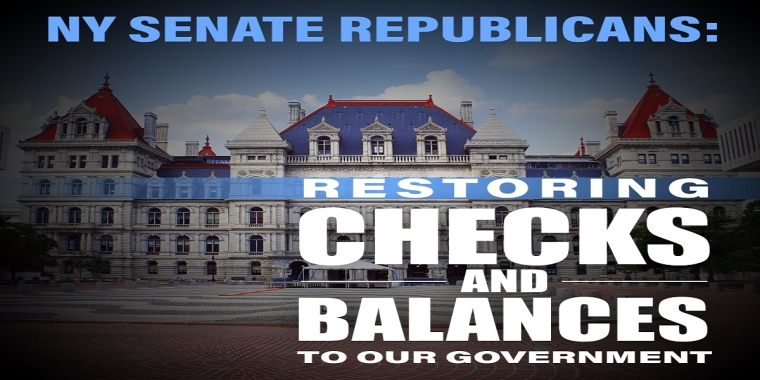
Senator Flanagan Sponsors Historic Plan To Fight Medicaid Fraud
To protect New York taxpayers from Medicaid fraud, Senator John J. Flanagan (2nd Senate District) has sponsored the Medicaid Fraud Prevention and Recovery Reform Act of 2006. This multiple point plan, which has passed the New York State Senate, would fight fraud and abuse at every step of the process and could potentially save taxpayers $2 billion annually.
"Medicaid fraud takes money out of the pockets of working families, puts pressure on the local governments of our state and affects the health care of our state's most vulnerable. This legislation should serve notice to those who would defraud this vital system that New York State is working to put you out of business to protect our taxpayers," stated Senator Flanagan.
The Medicaid Fraud Prevention and Recovery Reform Act of 2006 is based on the successful program that was initiated in Texas. The Texas program increased the amount recovered from Medicaid fraud by 30 percent in the first year and now annually recoups five percent of its total Medicaid expenditures. If the reforms sponsored by Senator Flanagan have similar success, the $46 billion Medicaid program would recover an annual average of over $2.3 billion.
The Medicaid Fraud Prevention and Recovery Reform Act of 2006 would include:
-Office of Medicaid Inspector General: The legislation would integrate the responsibilities and staff from each of the eight involved state agencies into a new Office of Medicaid Inspector General. This office, which would be included in the Department of Health, would be completely independent and report directly to the Governor.
The Inspector General would focus on compliance, investigation and recoupment/sanctions and review all Medicaid expenditures and investigate those identified as suspected fraud or abuse. The office would have the power to withhold payment until the claim is determined to be appropriate, impose administrative sanctions and pursue civil recoveries and third-party recoveries.
For those fraudulent claims determined to be criminal, the Office of the Medicaid Inspector General would serve as the investigative arm of any case.
-Access to Information for Local Prosecutions: The Medicaid Fraud Control Unit, which is within the Attorney General's office, would have 30 days to accept a criminal fraud case from the Medicaid Inspector General's office. If it declines to accept, the case would be automatically be referred to the local district attorney for further action.
-Restoration of the Local Share for Certain Medicaid Fraud Recoveries: If evidence or information from a local county is utilized to recover funding, the county involved would receive 15 percent of the non-federal share. If the resolution of the case was fully handled through county action, then the county and the county's district attorney's office would each receive 20 percent of the non-federal share of restitution.
-False Claims Act: This office would mirror the federal False Claims Act and would bring New York State in compliance with the federal Deficit Reduction Act. By doing so, the state would be able to receive 10 percent of the federal share of any monetary recovery.
-Improved Technology: The act would direct the Department of Health to contract with vendors for upgraded information technology necessary to detect Medicaid fraud, conduct utilization review and coordinate third-party benefits (health plans). This improvement in technology would enhance accountability in Medicaid expenditures throughout the process and coordinate benefits with health plans to ensure Medicaid is the payor of last resort.
-New Medicaid Fraud Offenses and Penalties: The act would incorporate tougher civil and criminal penalties for those who commit Medicaid fraud.
-Health Insurance Fraud Report: To ensure full investigation of health insurance fraud, the act would require the State Insurance Department to annually submit a report detailing its investigation cases submitted by health plans. Currently, SID is investigating only 2.9 percent of all such cases and this change would improve this area of investigation.
-Corporate Compliance Program: As a prerequisite for Medicaid eligibility, larger Medicaid providers would be required to implement corporate compliance and internal controls programs designed to prevent improper and inaccurate billings and fraud. This is designed to remove the ability of these corporations to defraud the government and the public.
-New York Prosecutor's Training Institute Appropriation: The Medicaid fraud package includes a $500,000 budget appropriation for NYPTI to conduct an educational program relating to Medicaid fraud for local district attorneys and prepare materials for their use. In addition, the grant would require NYPTI to report to the Legislature regarding the necessity of additional staff in certain district attorneys’ offices to prosecute Medicaid fraud and judicial reforms.
Senator Flanagan is a member of the Senate Medicaid Reform Task Force, which held hearings throughout the state on the issue of Medicaid fraud. The work of that task force lead to the current proposal.
At the hearings, the task force received input and suggestions from people in the health care industry and the law enforcement community on what could be done to strengthen the state’s efforts to detect and prevent Medicaid fraud.
Among those who testified at the hearings was Texas Health and Human Services Commission Inspector General Brian Flood, who spoke about the remarkable results of the Texas Medicaid fraud plan. Mr. Flood will discuss New York’s legislation as a model for state level efforts to fight Medicaid fraud when he testifies before the United States Senate.
The Senate Medicaid Reform Task Force recommended several important measures that have become law, including the State cap on local Medicaid expenses and the State takeover of the local share of the Family Health Plus program. A recent report from the New York State Comptroller's Office declared that the Medicaid cost takeover will save Suffolk County taxpayers $22 million dollars in 2006 and it is estimated that the program will save Suffolk County homeowners over $280 million over the next five years. PLEASE CLICK HERE FOR MORE INFORMATION ABOUT THIS ISSUE.
"The taxpayers of Long Island pay enough to cover the real needs of our neighbors and they should never have to pay one extra dime to cover the cost of fraud. This package will safeguard their hard-earned money from Medicaid fraud and ensure that tax dollars are protected from the unlawful actions of those who seek to rip off the Medicaid system," stated Senator Flanagan. "Long Island residents will support a program that assists millions but they should only be asked to do so when every effort is made to protect that program from fraud and abuse."
The Medicaid Fraud Prevention and Recovery Reform Act of 2006 has been sent to the Assembly for further action.
TO SEND AN EMAIL TO SENATOR FLANAGAN, PLEASE CLICK HERE.
IF YOU WOULD LIKE TO RECEIVE REGULAR UPDATES FROM SENATOR FLANAGAN, PLEASE CLICK HERE.



